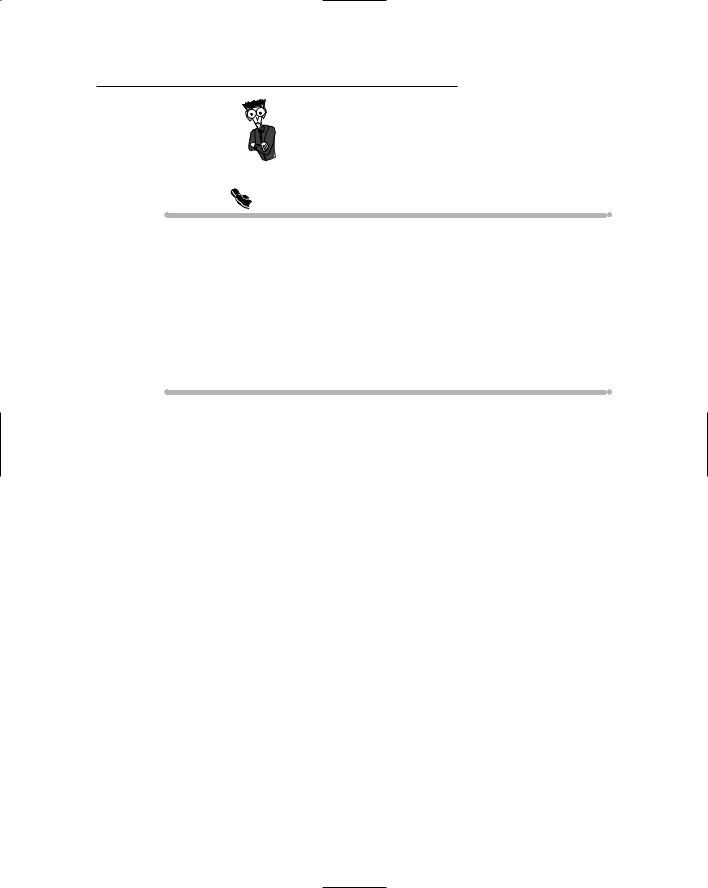
Arabic_for_Dummies
.pdf
136 Part II: Arabic in Action
Form |
Pronunciation |
Translation |
antumaa dhahabtumaa |
ahn-too-mah |
You went |
|
za-hab-too-mah |
(dual/MP/FP) |
humaa dhahabaa |
hoo-mah za-hah-bah |
They went (dual/MP) |
humaa dhahabataa |
hoo-mah za-hah-bah-tah |
They went (dual/FP) |
Use the form yadhhabu to conjugate dhahaba in the muDaari’ form:
Form |
Pronunciation |
Translation |
‘anaa ‘adhhabu |
ah-nah az-hah-boo |
I am going |
‘anta tadhhabu |
ahn-tah taz-hah-boo |
You are going (MS) |
‘anti tadhhabiina |
ahn-tee taz-hah-bee-nah |
You are going (FS) |
huwa yadhhabu |
hoo-wah yaz-hah-boo |
He is going |
hiya tadhhabu |
hee-yah taz-hah-boo |
She is going |
naHnu nadhhabu |
nah-noo naz-hah-boo |
We are going |
‘antum tadhhabuuna |
ahn-toom taz-hah-boo-nah |
You are going (MP) |
‘antunna tadhhabna |
ahn-too-nah taz-hab-nah |
You are going (FP) |
hum yadhhabuuna |
hoom yaz-hah-boo-nah |
They are going (MP) |
hunna yadhhabna |
hoo-nah yaz-hab-nah |
They are going (FP) |
antumaa tadhhabaani |
ahn-too-mah |
You are going |
|
taz-hah-bah-nee |
(dual/MP/FP) |
humaa yadhhabaani |
hoo-mah yaz-hah-bah-nee |
They are going |
|
|
(dual/MP) |
humaa tadhhabaani |
hoo-mah taz-hah-bah-nee |
They are going |
|
|
(dual/FP) |
Talkin’ the Talk
Adam and Asmaa are debating whether to go to the movies.
Asmaa: hal turiidu ‘an nadhhab ‘ilaa al-matHaf al-yawm? hal too-ree-doo ann naz-hab ee-lah al-mat-haf al-yah-oum?
Do you want to go to the museum today?
Adam: laa. ‘anaa ‘uriidu ‘an ‘adhhab ‘ilaa al-maSraH as-siiniima’ii.
lah. ah-nah oo-ree-doo ann az-hab ee-lah al-mas-rah ah-see-nee-mah-ee.
No. I would like to go to the movie theater.

Chapter 7: Around Town 137
Asmaa: wa laakin al-maSraH as-siiniima’ii ba’iid min hunaa. wah lah-keen al-mas-rah ah-see-nee-mah-ee bah-eed meen hoo-nah.
But the movie theater is far from here.
Adam: yumkin ‘an nadhhab ‘ilaa al-maSraH fii al-Haafila. yoom-keen ann naz-hab ee-lah al-mas-rah fee al-hah-fee-lah.
We can go to the movies by bus.
Asmaa: mataa sayabda’u ash-shariiT? mah-tah sah-yab-dah-oo ah-sha-reet?
When does the movie begin?
Adam: fii saa’a wa niSf.
fee sah-ah wah nee-sef.
In an hour and a half.
Asmaa: ‘ay shariiT sayal’abu fii al-maSraH al-yawm? aiy sha-reet sah-yal-ah-boo fee al-mas-rah al-yah-oum?
Which movie is going to be playing today?
Adam: ‘aakhir shariiT min anjaliina joolii.
ah-keer sha-reet meen an-jah-lee-nah joo-lee.
The latest Angelina Jolie movie.
Asmaa: na’am? li-maadhaa lam taqul dhaalika min qabl? nah-am? lee-mah-zah lam tah-kool zah-lee-kah meen kah-bel?
Really? Why didn’t you say so earlier?
Adam: li-maadhaa? lee-mah-zah?
How come?
Asmaa: ‘anaa ‘uHibbu haadhihi al-mumathila kathiir!
ah-nah oo-hee-boo hah-zee-hee al-moo-mah-thee-lah kah-theer.
I like this actress a lot!
Adam: kwayyis. hayyaa binaa! kuh-wah-yees. hah-yah bee-nah!
Okay. Let’s go!
Asmaa: hayyaa binaa! hah-yah bee-nah!
Let’s go!

138 Part II: Arabic in Action
Words to Know
turiidu |
too-ree-doo |
to want |
ba’iid |
bah-eed |
far |
qariib |
kah-reeb |
close |
‘aakhir |
ah-keer |
last/latest |
kathiir |
kah-theer |
a lot |
qaliil |
kah-leel |
a little |
mumathil |
moo-mah-theel |
actor |
mumathila |
moo-mah-thee-lah |
actress |
mudiir |
moo-deer |
director |
mushaahid |
moo-sha-heed |
spectator (MS) |
mushaahida |
hoo-sha-hee-dah |
spectator (FS) |
Touring Religious Sites
If you ever get a chance to go to the Middle East, I suggest you visit some of the beautiful religious sites that are spread across the land. If you’re in a Middle Eastern or Arab city, be sure to check out a masjid (mas-jeed; mosque). The largest masaajid (mah-sah-jeed; mosques) in the Muslim world are located in Mecca and Medina, Saudi Arabia, and in Casablanca, Morocco.
A few rules to keep in mind
When visiting masaajid, you must follow certain qawaa’id (rules):
If you’re Muslim, you’re allowed to walk into any masjid you like; but before entering, you must remove your shoes and say the shahada
(shah-hah-dah; religious prayer): laa ‘ilaaha ‘illaa allah wa muHammad rasuul allah (lah ee-lah-hah ee-lah ah-lah wah moo-hah-mad rah-sool ah-lah; There is no god but God and Muhammad is his Prophet.).

Chapter 7: Around Town 139
If you’re non-Muslim, entry into a masjid is generally forbidden, whether you’re in the Middle East, the United States, or anywhere around the world. However, certain mosques, such as the masjid Hassan II in Casablanca, have designated wings that are open to both Muslims and non-Muslims. These wings are set aside more as exhibition rooms than as religious or prayer rooms, so you’re allowed to enter them, but you still must remove your Hidaa’ (hee-dah; shoes).
The word masjid comes from the verb sajada (sah-jah-dah), which means “to prostrate” or “to kneel.” Another word for “mosque” is jaami’ (jah-meeh), which comes from the word jama’a (jah-mah-ah; to gather). So the Arabic words for “mosque” are related to what one actually does in the mosque, which is to gather in a religious setting and pray.
The Hajj
One of the most popular events during the year for Muslims is the Hajj (haj), which is the pilgrimage to Mecca in Saudi Arabia. The Hajj, which generally lasts for five days, takes place once a year and is actually one of the five pillars of Islam. Technically, attending the Hajj is mandatory for Muslims, but because the pilgrimage can be expensive, it’s widely accepted that one can be a Muslim without actually having to attend the Hajj.
During the Hajj, Hajjaaj (hah-jaj; pilgrims) must follow a number of qawaa’id. As soon as the Hajjaaj arrive in Mecca, they must shed all their worldly clothing and possessions and change into sandals and a simple ihram (eeh-ram), which basically consists of a white cloth wrapped around the body. Other than these two items, the Hajjaaj aren’t allowed to wear any watches, jewelry, or any other types of clothes. The logic behind wearing only the ihram is that every Hajjaaj is equal before God, and because no difference exists between a king and a beggar during the Hajj, everyone must wear the same thing.
After they don the ihram, the Hajjaaj begin a ritual known as the Tawaf (tahwaf; to turn), in which they walk around the ka’ba (kah-bah), a cubelike structure located in the middle of the masjid al-Haraam (mas-jeed al-hah-ram; The Sacred Mosque of Mecca). According to the Koran and other religious texts, the ka’ba was built by the Prophet Abraham for the purpose of worship. The Hajjaaj must circle the ka’ba seven times in an anti-clockwise manner. After the Tawaf, the Hajjaaj walk to the hills of Safa and Marwah before walking to Medina, the city where the Prophet Muhammad is buried. From Medina, the Hajjaaj walk to the hill of Arafat, then to the city of Mina, before returning to the ka’ba for a final Tawaf.

140 Part II: Arabic in Action
Because the Hajj is one of the five pillars of Islam, literally millions upon millions of people make the voyage to Saudi Arabia to participate in this pilgrimage every year, making it by far the largest religious pilgrimage in the world. In fact, it’s not uncommon to have at least 5 million Hajjaaj in the cities of Mecca and Medina during the Hajj. Once a Muslim has performed the Hajj, he or she receives a special status in society, complete with a title: A man who has completed the Hajj is called al-Hajj (al-haj), and a woman who has done the Hajj is called al-Hajja (al-hah-jah).
Saudi Arabian law prohibits non-Muslims from entering Mecca during the ‘amra (am-rah; the time of year when the Hajj takes place). If you’re nonMuslim, you may be able to visit Saudi Arabia and some of its other mosques and religious sites during this period, but you won’t be permitted to visit the ka’ba and some of the other religious sites related to the Hajj.

Chapter 7: Around Town 141
 Fun & Games
Fun & Games
Match the hours on the left with their Arabic equivalents on the right.
5:30 as-saa’a as-saadisa wa ar-rubu’ fii aS-SabaaH
7:45 as-saa’a at-taasi’a fii aS-SabaaH
9:00 a.m. as-saa’a ath-thaamina ‘ilaa ar-rubu’
2:30 p.m. as-saa’a al-khaamisa wa an-niSf
6:15 a.m. as-saa’a ath-thaaniya wa an-niSf fii ba’da aDH-DHuhr
The answers are in Appendix C.

142 Part II: Arabic in Action

Chapter 8
Enjoying Yourself: Recreation
In This Chapter
Getting active
Playing sports
Exploring the beach
Tuning in to musical instruments
Language teachers may not want you to hear this, but if you want to practice a new language, move outside the classroom. Doing things you like,
such as playing sports, creating music, or playing card games, is one of the best ways to immerse yourself in your chosen language. In this section, I introduce new words and phrases to help you have fun in Arabic!
Starting Out with the Verbs fa’ala (Did) and yaf’alu (To Do)
One of the most frequently used verbs in the Arabic language is fa’ala (fah-ah- lah; did). In the maaDii (mah-dee; past tense), use the fa’ala form; for the muDaari’ (moo-dah-reeh; present tense), use yaf’alu (yah-feh-ah-loo; to do/doing). Use the verb fa’ala to describe activities or riyaaDa (ree-yah-dah; sports) you’re taking part in.
Here’s the verb fa’ala conjugated in the maaDii form:
Form |
Pronunciation |
Translation |
‘anaa fa’altu |
ah-nah fah-all-too |
I did |
‘anta fa’alta |
ahn-tah fah-all-tah |
You did (MS) |
‘anti fa’alti |
ahn-tee fah-all-tee |
You did (FS) |
huwa fa’ala |
hoo-wah fah-ah-lah |
He did |
hiya fa’alat |
hee-yah fah-ah-laht |
She did |

144 Part II: Arabic in Action
Form |
Pronunciation |
Translation |
naHnu fa’alnaa |
nah-noo fah-ahl-naa |
We did |
‘antum fa’altum |
ahn-toom fah-ahl-toom |
You did (MP) |
‘antunna fa’altunna |
ahn-too-nah fah-all-too-nah |
You did (FP) |
hum faa’aluu |
hoom fah-ah-loo |
They did (MP) |
hunna faa’alna |
hoo-nah fah-all-nah |
They did (FP) |
antumaa faa’altumaa |
ahn-too-mah fah-all-too-mah |
You did (dual/ |
|
|
MP/FP) |
humaa faa’alaa |
hoo-mah fah-ah-lah |
They did (dual/ |
|
|
MP) |
humaa faa’alataa |
hoo-mah fah-ah-lah-tah |
They did (dual/ |
|
|
FP) |
Here are a few examples of the verb fa’ala in action:
al-walad dhahaba ‘ilaa al-maktaba wa fa’ala waajibuhu. (al-wah-lad zah-hah-bah ee-lah al-mak-tah-bah wah fah-ah-lah wah-jee-boo-hoo; The boy went to the library and did his homework.)
fa’alat al-‘amal ‘alaa aT-Taawila. (fah-ah-lat al-ah-mal ah-lah ah-tah-wee- lah; She did the work on the table.)
fa’altu at-tamriinaat fii al-manzil. (fah-all-too ah-tam-ree-nat fee al-man- zeel; I did the exercises at home.)
Then use the form yaf’alu to conjugate “to do” in the muDaari’:
Form |
Pronunciation |
Translation |
‘anaa ‘af’alu |
ah-nah ah-fah-loo |
I am doing |
‘anta taf’alu |
ahn-tah tah-fah-loo |
You are doing |
|
|
(MS) |
‘anti taf’aliina |
ahn-tee tah-fah-lee-nah |
You are doing |
|
|
(FS) |
huwa yaf’alu |
hoo-wah yah-fah-loo |
He is doing |
hiya taf’alu |
hee-yah tah-fah-loo |
She is doing |
naHnu naf’alu |
nah-noo nah-fah-loo |
We are doing |
‘antum taf’aluuna |
ahn-toom tah-fah-loo-nah |
You are doing |
|
|
(MP) |
‘antunna taf’alna |
ahn-too-nah tah-fal-nah |
You are doing |
|
|
(FP) |

Chapter 8: Enjoying Yourself: Recreation 145
Form |
Pronunciation |
Translation |
hum yaf’aluuna |
hoom yah-fah-loo-nah |
They are doing |
|
|
(MP) |
hunna yaf’alna |
hoom yah-fal-nah |
They are doing |
|
|
(FP) |
antumaa taf’alaani |
ahn-too-mah tah-fah-lah-nee |
You are doing |
|
|
(dual/MP/FP) |
humaa yaf’alaani |
hoo-mah yah-fah-lah-nee |
They are doing |
|
|
(dual/MP) |
humaa taf’alaani |
hoo-mah tah-fah-lah-nee |
They are doing |
|
|
(dual/FP) |
Here are some examples that include the verb yaf’alu:
naf’alu al-‘awraaq al-’aan. (nah-fah-loo al-aw-rak al-an; We are doing the paperwork right now.)
taf’alu at-tajriibaat fii al-Hadiiqa. (tah-fah-loo ah-taj-ree-bat fee al-hah- dee-kah; She is doing the experiments in the garden.)
hal taf’aluuna al-‘amal li al-ghad? (hal tah-fah-loo-nah al-ah-mal lee al-gad; Are you doing the work for tomorrow?)
Sporting an Athletic Side
I don’t know about you, but I love playing riyaaDa, whether it’s an individual sport such as al-ghuulf (al-goo-lef; golf) or a team sport like kurat al-qadam
(koo-rat al-kah-dam; soccer).
kurat al-qadam is one of the most popular sports among Arabic-speaking people; in the Middle East, it comes as close as any sport to being the “national” sport. One reason why kurat al-qadam is so popular is because it’s a riyaaDa mushaahada (ree-yah-dah moo-sha-hah-dah; spectator sport). In a typical mubaara (moo-bah-rah; game), one fariiq (fah-reek; team) with 11 players plays another fariiq in a mal’ab (mah-lab; stadium). Fans follow the natiija (nah-tee-jah; score) closely, hoping that their fariiq manages a fawz (fah-wez; win). Not surprisingly, excited fans react to every khata’ (kah-tah; foul), often disagreeing with the Hakam (hah-kam; referee).
If you find yourself enjoying kurat al-qadam or a number of other team sports with a friend who speaks Arabic, the following terms may come in handy:
malaabis riyaaDiyya (mah-lah-bees ree-yah-dee-yah; uniforms)
khasar (kah-sar; loss)
